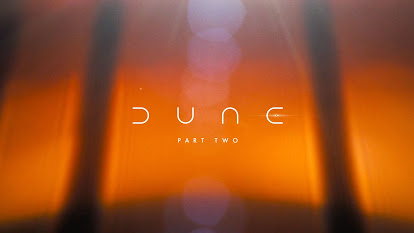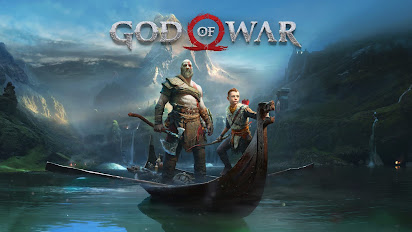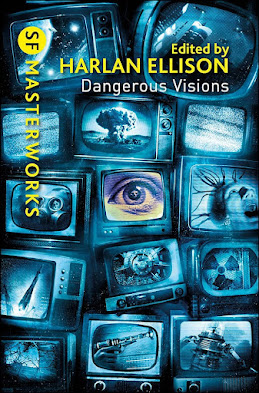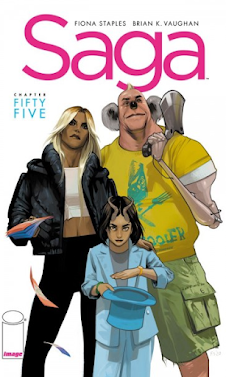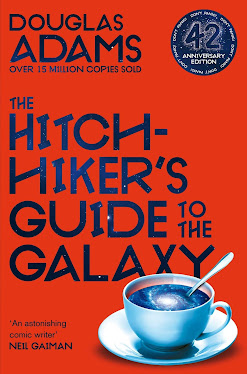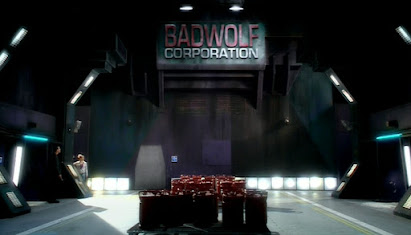Wednesday, 27 October 2021
Amazon release new WHEEL OF TIME trailer
Tuesday, 26 October 2021
DUNE: PART TWO formally greenlit for October 2023 release
Sunday, 24 October 2021
Netflix commissions LAST KINGDOM movie
The Longest SFF Novels & Series of All Time (2021 update)
These lists are not exhaustive and consistency of reporting these figures can be quite variable. I have opted for word counts as the most accurate way of estimating length, as page counts can vary immensely based on page margins and font sizes.
Longest Novels
1. Varney the Vampire by James Malcolm Rymer and Thomas Peckett Prest
667,000 words • 1845-47
This long novel was serialised in "penny dreadfuls" of the mid-19th Century and chronicles the adventures of Sir Francis Varney, a vampire. This book's genre credentials have been disputed (with the suggestion that Varney is actually a madman rather than a real vampire), but there seems to be a general acceptance that the book is a genuine work of the fantastic, and the longest SFF work ever published in one volume (which it was in 1847). The book was also influential on Bram Stoker's later Dracula (1897) and introduced many of the tropes of vampire fiction, including the "sympathetic vampire" protagonist.
2. Atlas Shrugged by Ayn Rand
645,000 words • 1957
Highly debatable as a genre work rather than a political novel, although the story is partially set against a dystopian background and genre historian John Clute identifies the novel as SF (plus it inspired the very SF Bioshock video game series and fantasy Sword of Truth series), so okay, we'll count it.
3. Jerusalem by Alan Moore
615,000 words • 2016
Alan Moore's prose magnum opus is a massive, dizzying and baffling journey into the surreal. It's so huge that it is also available in a two-volume edition in a nice slipcase.
4. Infinite Jest by David Foster Wallace
545,000 words • 1996
Infinite Jest has primarily literary allusions, although the book's setting - a North American superstate consisting of a unified Canada, USA and Mexico - is a futuristic dystopia. The book could have even been bigger, with 250 manuscript pages trimmed for length by the publishers.
5. To Green Angel Tower by Tad Williams
520,000 words • 1993
The concluding volume of Memory, Sorrow and Thorn is bigger than the first two novels in the series (The Dragonbone Chair and Stone of Farewell) combined. A titanic, shelf-destroying novel, it is only available in mass-market paperback in two volumes, subtitled Siege and Storm.
6. The Fiery Cross by Diana Gabaldon
502,000 words • 2001
The fifth volume of Diana Gabaldon's Outlander historical romance series, spiced up by a time-spanning culture clash, is absolutely gigantic.
7. A Breath of Snow and Ashes by Diana Gabaldon
501,000 words • 2005
The sixth volume of Diana Gabaldon's Outlander historical romance series doesn't quite match its predecessor in size but it can still be used to stun a yak.
8. Ash: A Secret History by Mary Gentle
500,000 words • 2000
Mary Gentle's novel is a dazzling mix of SF, historical drama, fantasy, alternate history and general bizarrity. The novel was published in one volume in the UK, but the American publishers released it as four in the USA.
472,376 words • 1978
Stephen King's biggest novel in a single volume, notable for also foreshadowing The Dark Tower series. The above word count is for the expanded and revised edition.
10. The Lord of the Rings by J.R.R. Tolkien
470,000 words • 1954-55
This book needs no introduction. The most influential fantasy novel ever written, often incorrectly cited as the biggest genre novel of all time. Due to paper shortages after the Second World War, the book was released in three volumes (The Fellowship of the Ring, The Two Towers, The Return of the King), inadvertently creating the classic fantasy trilogy at the same time. The novel has been available in its intended one-volume version since the 1960s.
11. The Naked God by Peter F. Hamilton
469,000 words • 1999
The biggest space opera novel ever published, even more remarkable because it was the concluding volume of an even bigger trilogy, The Night's Dawn.
12. Rhythm of War by Brandon Sanderson
13. Oathbringer by Brandon Sanderson
451,912 words • 2017
The third Stormlight Archive novel couldn't quite match the fourth for size. Remember when Sanderson told us the first novel (a now novella-feeling 380,000 words) would be the longest? Yeaaaah.
14. It by Stephen King
445,134 words • 1986
Arguably, Stephen King's most famous single novel thanks to multiple TV and film adaptations.
15. A Storm of Swords by George R.R. Martin
422,000 words • 2000
George R.R. Martin started his Song of Ice and Fire series being somewhat concerned about the word count and went to great lengths to keep the first two books down to a friendly 300,000 words or so apiece, dropping chapters back into the next volume if necessary. However, with Martin planning a five year time-jump after this book, he had no choice but to write the story to its natural conclusion. The result was a book that pushed the UK publishers to the limits of what they could publish in one volume. The paperback version, in fact, was released in two volumes.
16. A Dance with Dragons by George R.R. Martin
420,000 words • 2011
The difficult-to-write fifth volume in A Song of Ice and Fire ended up being somewhat longer than A Storm of Swords, but Martin cut it down to slightly shorter in the final sweat and edit.
17. Cryptonomicon by Neal Stephenson
415,000 words • 1999
Neal Stephenson's first gigantic book, but not his last (although this remains his longest book) is an interesting romp through WWII history, cryptography and weirdness. A stand-alone, but it also acts as a thematic prequel (and actual sequel) to his later Baroque Cycle.
18. An Echo in the Bone by Diana Gabaldon
402,000 words • 2009
The seventh Outlander novel is huge, but feels quite modest compared to the longest books in the series mentioned above.
19. Drums of Autumn by Diana Gabaldon
401,000 words • 1996
The fourth Outlander novel. Given the several books in the series that are just under 400,000 words, I can only assume that the author gets through a lot of keyboards.
= 20. The Wise Man's Fear by Patrick Rothfuss
400,000 words • 2011
Patrick Rothfuss's sequel to The Name of the Wind is considerably larger. It remains to be seen (still) if the final volume of The Kingkiller Chronicle, The Doors of Stone, will be bigger still.
= 20. Words of Radiance by Brandon Sanderson
400,000 words • 2014
The second volume of The Stormlight Archive is lost its record-setting status as Sanderson's biggest novel and the biggest novel in the series to both of its following volumes. But it's still pretty big.
Below 400,000 words, the number of fantasy and SF novels in that size bracket shoots up massively. So rather than try to come up with an exhaustive list, here's some notable SFF novels with their word counts:
- Lord of Chaos is the sixth and longest Wheel of Time novel, clocking in at 395,000 words, shading the fourth volume, The Shadow Rising, at 386,000.
- Toll the Hounds is the eighth and longest Malazan Book of the Fallen novel, reaching 389,000 words.
- Maia, by the late Richard Adams, is 379,130 words.
- Magician, by Raymond E. Feist, is a relatively breezy 313,410 words (about 330,000 words in the 1992 extended edition). Which makes the decision to publish the novel in two volumes in the United States (as Apprentice and Master) all the weirder.
- Jonathan Strange and Mr. Norell is 309,000 words.
- Temple of the Winds, the longest Sword of Truth novel, is a modest 307,520 words in length.
- The Order of the Phoenix, the longest Harry Potter novel, is 257,045 words in length. That's over three times the length of the shortest novel in the series, The Philosopher's Stone.
- The Sword of Shannara, the novel that popularised and kickstarted the modern fantasy genre in 1977, is a relatively modest 228,160 words. It's also still Terry Brooks's biggest novel, by far; none of the other Shannara novels top 200,000 words and only three top 150,000 words.
- SF is generally a lot shorter than fantasy, but the fact that Frank Herbert's seminal Dune is only 188,000 words - shorter than three of the Harry Potter books! - might be surprising.
The Longest SFF Series
This is a much more debatable list, since some series are more diffuse than others. The Riftwar books, for example, form nine distinct series, but also have narrative elements spanning all twenty-nine books in the series. The same is true of the Shannara series, whilst Discworld and Recluce consist more of stand-alone novels with some continuing elements. This list is therefore a bit more speculative, and is not exhaustive.
- The Wheel of Time by Robert Jordan & Brandon Sanderson (15 volumes): 4,360,000 words.
- The Realm of the Elderlings by Robin Hobb (16 volumes): 4,071,000 words.
- The Shannara Series by Terry Brooks (32 volumes, including the Word and the Void sequence): 4,070,030 words.
- The Riftwar Cycle by Raymond E. Feist (29 volumes): 3,831,670 words.
- Discworld by Terry Pratchett (41 volumes): approx. 3,800,000 words (not inc.luding the science books or companion guides).
- The Malazan Book of the Fallen by Steven Erikson (10 volumes): 3,274,000 words (just under 6 million including all related works by Erikson and Ian Esslemont).
- Outlander by Diana Gabaldon (8 volumes, incomplete): 3,227,000 words (the next book in the series is published next month, so this will no doubt shoot up).
- The Cosmere by Brandon Sanderson (12 novels/1 anthology, incomplete): 3,427,830 words.
- The Sword of Truth by Terry Goodkind (11 volumes): 2,761,170 words (3,643,650 including the sequels).
- The Dragonriders of Pern by Anne & Todd McCaffrey: 2,700,200 words (1,577,000 by Anne alone)
- The Dresden Files by Jim Butcher (17 volumes incomplete): 2,200,000 words
- The Wars of Light and Shadow by Janny Wurts (9 volumes, incomplete): 2,195,000 words.
- The Chronicles of Thomas Covenant by Stephen Donaldson (10 volumes): 2,062,000 words.
- The Shadows of the Apt by Adrian Tchaikovsky (10 volumes): 1,924,000 words.
- The Belgariad/Malloreon by David & Leigh Eddings (12 volumes): 1,861,000 words.
- A Song of Ice and Fire by George R.R. Martin (5 volumes, incomplete): 1,749,000 words; 2,160,000 words including Fire & Blood and A Knight of the Seven Kingdoms.
- The Stormlight Archive by Brandon Sanderson (4 volumes, incomplete): 1,731,000 words (part of the Cosmere mega-series).
- Crown of Stars by Kate Elliott (7 volumes): 1,622,720 words.
- Robots, Empire & Foundation by Isaac Asimov (14 novels, 2 short story collections): 1,548,000 words.
- The Solar Cycle by Gene Wolfe (11 volumes): 1,368,000 words.
- The Expanse by James S.A. Corey (8 volumes, incomplete): 1,334,000 words.
- The Dark Tower by Stephen King (8 volumes): 1,256,000 words.
- The Night's Dawn Trilogy by Peter F. Hamilton (3 volumes): 1,247,000 words.
- Otherland by Tad Williams (4 volumes): 1,189,000 words.
- The Second Apocalypse by R. Scott Bakker (7 volumes, possibly incomplete): 1,182,000 words.
- Memory, Sorrow and Thorn by Tad Williams (3 volumes): 1,126,000 words (1,715,000 including The Heart of What Was Lost and The Last King of Osten Ard so far).
- The Baroque Cycle by Neal Stephenson (3 volumes): 1,125,000 words (1,540,000 including Cryptonomicon).
- Temeraire by Naomi Novik (9 volumes): 1,100,000 words
- Harry Potter by J.K. Rowling (7 volumes): 1,084,170 words (1,183,370 including The Cursed Child).
- Mistborn by Brandon Sanderson (6 volumes, incomplete): 1,077,560 words.
- The Elenium/Tamuli by David Eddings (6 volumes): 1,006,000 words.
- The Sword of Shadows by J.V. Jones (4 volumes, incomplete): 945,047 words.
- Dune by Frank Herbert (6 volumes): 839,000 words.
- The Gap Cycle by Stephen Donaldson (5 volumes): 815,000 words
- The Acts of Caine by Matt Stover (4 volumes): 768,000 words.
- The First Law by Joe Abercrombie (3 volumes): 618,000 words (1,216,000 including the stand-alone sequels; 1,788,300 including The Age of Madness).
- The Wandering Inn by pirateaba: 8,298,188 words (as of the first 8 volumes)
- A Practical Guide to Evil by Erratic Errata: 2,150,000 words
- Ward by John McCrae: 1,944,784 words
- Worm by John McCrae: 1,680,000 words
- Twig by John McCrae: 1,600,000 words
Why Page Counts Vary
It's remarkable what difference shifting a margin over by a few millimetres can make. One-volume editions of The Lord of the Rings, for example, can vary from 750 pages (for tiny-font editions on onion paper) to the better part of 2,000 (for large-print versions for readers with bad eyesight). Back in 2001 Pan Macmillan were able to squeeze thepaperback of The Naked God (469,000 words) into almost the exact same page count as its predecessor novel, The Reality Dysfunction (385,000 words) despite being significantly longer, just by manipulating font sizes and margins.
This is why page count is a poor guide to working out a novel's true length, and word count is more reliable indicator.
Word counts can also differ, depending on the programme used (most modern word counts come from the ebook editions) and how they count punctuation. Some counters will also include cast lists, footnotes and appendices, others will disregard them. The publishers may even give differing word counts because they did a count before the last edits were finalised, or they forgot that the new edition has more stuff in it.
Sources
SFF blogger Abalieno has been keeping tabs on book lengths over on Looping World for many years and some of these figures come directly from there. Excellent work from him there.
Novel Word Count doesn't seem to be as exhaustive as it was planned to be, but its Stephen King page is pretty good.
Saturday, 23 October 2021
Mythic Quest: Season 1
Thursday, 21 October 2021
Dune: Part One
Wednesday, 20 October 2021
PlayStation mega-franchise GOD OF WAR coming to PC
Ted Lasso: Season 1
Only Murders in the Building: Season 1
Tuesday, 19 October 2021
THE LAST DANGEROUS VISIONS goes out to publishers
Monday, 18 October 2021
A Stranger in Olondria by Sofia Samatar
Jevick of Tyom has grown up on an isolated island. He is given a tutor from the far-off empire of Olondria, who teaches him to read and fills his head with stories of that distant land. Circumstances lead Jevick to Bain, Olondria's cultured capital, where he fills his days with parties and books, but he is also haunted by an encounter with a dying girl from his own land. Soon civil war threatens the country and Jevick embarks on a journey to rid himself of his spiritual discomfort, unaware of the events that will be set in motion.
First published in 2013, A Stranger in Olondria is the debut novel by the poet Sofia Samatar. An unusual book, the novel is not a traditional epic or secondary world fantasy, despite a vividly composed world with well thought-out histories, customs and geography, but a tone and mood piece hinging on themes such as learning, regret, language and the essence of story.
The novel's writing reminded me in turn of Guy Gavriel Kay and Ursula K. Le Guin, but with a unique atmosphere that is the author's own. There are very occasional bursts of action (a brief brawl, a confused flight through the countryside) but the book reveals its story and intentions through dialogue, thoughts and smaller short stories which are inset through the narrative. Jevick's function is sometimes less that of a protagonist than a sounding board or sponge, soaking up other characters' stories. He does have his own character arc though: Jevick's status as an outsider to Olondria gives him a fresh perspective on the empire and its complex royal and religious politics, but also makes him a pawn in the game between the two sides, one of whom imprisons him for insanity and the other liberates him as a symbol of resistance.
The book is also a love letter to the idea of reading stories and collecting books, which will no doubt warm the hearts of almost all book readers. Jevick's early distrust of books, which do not exist on his home island and where people do not read, gives way to almost drowning in the stories and ideas he finds on the pages of his tutor's collection. Later in the book he embarks on teaching his own community to read, and sharing the joy that comes from his experiences with them.
The novel's quiet, thoughtful prose is erudite and at times beautiful. Characterisation is strong, I always had an excellent sense of Jevick's motivations and, through his eyes, those of the characters he meets. I did feel his initial relationship with Jissavet was a bit too slight given their later closeness, and the pacing is sometimes uneven. In particular, much of the last quarter or so of the book is given over to Jissavet's backstory which is intriguing and powerful, but feels almost like a self-contained novella within the book's larger narrative. Jevick's story feels somewhat rushed to a conclusion in the handful of pages left after Jissavet's story concludes. It may also be that Samatar is less successful than the likes of Le Guin and Kay in weaving beautiful prose and thoughtful themes around a central plot and advancing all well simultaneously.
For that, A Stranger in Olondria is (****½) is still an accomplished novel. More of a mood piece than a plot-driven book, it has a haunting quality that will stick with the reader long after it is finished. The novel is available now in the UK and USA. The author has a further novel set in the same world, The Winged Histories.
